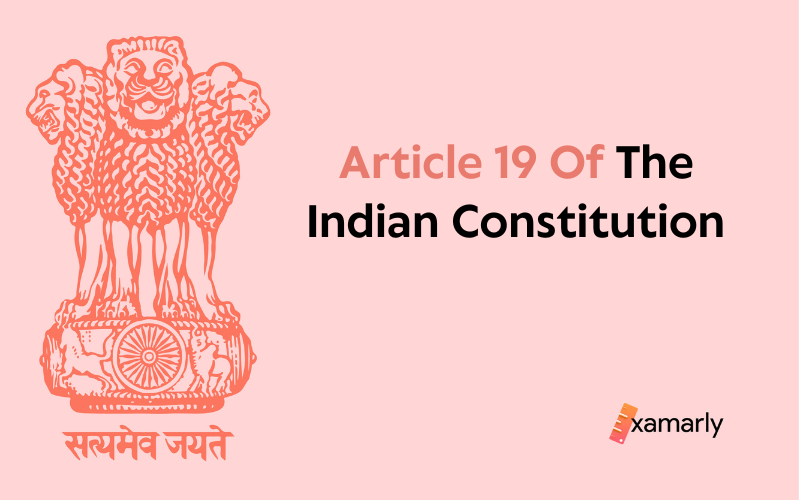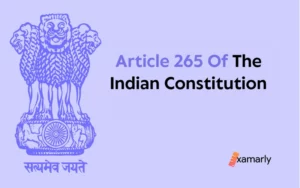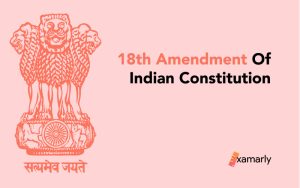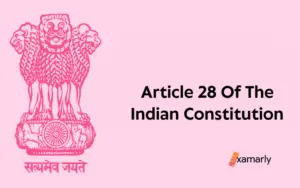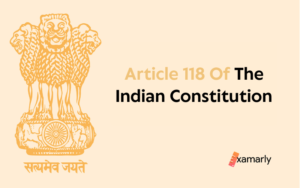Article 19 of the Indian Constitution says that every Indian citizen should have six fundamental freedoms. These are natural and fundamental liberties that come with being a citizen. These liberties are nevertheless subject to some logical limitations and are neither absolute nor unrestricted. The article will walk you through each of the six fundamental liberties guaranteed by Article 19 and the corresponding legal precedents.
The polity and constitution segments of the UPSC Civil Services Exam Syllabus include this subject as a fundamental topic.
- What Is Article 19 Of The Indian Constitution?
- Freedom Of Speech And Expression: Article 19(1)(a) And 19(2)
- Meaning Of Freedom Of Speech And Expression
- Scope
- Reasonable Limitations On The Right To Free Speech And Expression
- Freedom Of Assembly: Article 19(1)(b) And 19(3)
- Freedom To Form Associations, Unions Or Co-operative Societies: Article 19(1)(c) and 19(4)
- Freedom Of Movement And Residence: Article 19(1)(d), 19(1)(e) and 19(5)
- Freedom Of Profession, Occupation, Trade Or Business: Article 19(1)(g) and 19(6)
- Test Of Restrictions Under Article 19(2) To 19(6)
- Conclusion
- FAQs
- Which Amendment Has Amended Article 19?
- What 97th Amendment Of The Indian Constitution Has Amended Article 19?
- Forty-Fourth Amendment Has Deleted Which Right From Article 19?
- What Is Freedom Of Profession?
- Which 6 Freedoms Article 19 Guarantees?
- What Is Freedom To Move Freely?
- What Is The Concept Of Freedom Of Expression?
What Is Article 19 Of The Indian Constitution?
- All citizens have the following rights:
- (a) liberty of speech and expression;
- (b) the right to peaceful assembly without the use of force;
- (c) the right to organize associations or unions
- (d) the right to freedom of movement throughout India’s borders.
- (e) to dwell and establish oneself wherever in Indian territory;
- (g) to carry out any occupation, trade, or business, or to practice any profession.
- Nothing in subclause (a) of clause (1) shall impact the functioning of any existing law or prevent the State from enacting any law, as far as the law imposes reasonable regulations on exercising the right bestowed by that same subclause in the best interest of India’s sovereignty and integrity, the State’s safety, cordial ties with foreign States, public order, decency or morality, a friendly relation or in relation to contempt of court, vilification or provocation to commit a crime
- Nothing in subclause (b) of the aforementioned clause shall affect how any law is currently in effect or prevent the State from enacting legislation that would seek to impose reasonable restrictions on the exercise of the right granted by said subclause in the interest of India’s sovereign rights and integrity or civil security.
- Nothing in subclause (c) of the above-said clause shall affect the operation of any old legislation as far as it seeks to impose any law wanting to impose reasonable restrictions on the exercise of the right granted by the preceding subclause in the best interest of the sovereignty and territorial integrity, civil security, or sense of morality.
- Nothing in subclauses (d) and (e) of the previously stated clause shall affect the operation of any existing law insofar as it enforces or prevents the State from implementing any law seeking to impose reasonable restrictions on the exercise of any right granted by the said subclauses, either in the interest of the public at large or to protect the wants of any Scheduled Tribe.
- Nothing in sub-clause (g) of the aforementioned clause shall influence the operation of any existing legislation to the extent that it imposes, or prevent the State from passing any legislation imposing, in the interests of the public at large, strict controls on the exercise of the right bestowed by the said sub-clause. Nothing in the aforementioned sub-clause, specifically, shall affect the application of any existing law, insofar as it relates to, or prevent the State from enacting legislation regarding any matter:
- (i)the freedom of profession or technical skills that make it possible to carry on any vocation, trade, or business;
- (ii) the State, or a company owned or run by the State, carrying on any trade, business, industry, or service, whether to the complete or partial absence of citizens or otherwise.
Note: There were once seven freedom rights protected by article 19; however, the 44th amendment withdrew the Right to Hold and Dispose of Property from clause 1 subclause f of article 19 and added it to article 300A, making it no longer a fundamental right but rather an ordinary right.
Freedom Of Speech And Expression: Article 19(1)(a) And 19(2)
All citizens have the liberty of speech and expression. The foundation of freedom has been laid down under Article 19(1)(a). Freedom of speech and to express is the most basic freedom. It is the cornerstone of a democratic society. It is the first prerequisite for liberty and has a significant impact on how the general population feels.
Meaning Of Freedom Of Speech And Expression
Freedom of opinion and expression means the right to express via any medium. Every citizen has the right to be well informed. They shall be able to express their opinions, as well as the right to possess an opinion.
The phrase “freedom of speech and expression” has a wide connotation.
The freedom of ideas to spread, to be published, and to be circulated are all included.
To every Indian, the State protects their right to freedom of speech and expression.
To protect the integrity, security, and sovereignty of the nation, to maintain friendly relations with other countries, to maintain public order, and to prevent defamation, incitement to offence, and contempt of court, the State may impose restrictions on the right to free speech and expression.
Scope
- Freedom of the press: The right to free speech and expression includes several freedoms like freedom of publication, but the freedom of the press may be the most significant. Freedom of press means that there cannot be pre-censorship in the media, freedom of circulation, pre-stoppage of articles or topics of public importance from being published in newspapers, excessive taxation on the media, etc. However, constraints can be put in place for the sake of justice, but they must pass Article 19 (2)’s criteria.
The Supreme Court accepted that the freedom of the press was a crucial component of the right to freedom of speech and expression in Romesh Thaper vs State of Madras and Brij Bhushan v. State of Delhi. In Romesh Thaper vs State of Madras, Patanjali Sastri J. noted that freedom of speech and expression also covered the dissemination of ideas and that this right was guaranteed by freedom of circulation. - Right to know and to obtain information: The Supreme Court ruled that the citizens of this nation have a right to know about every public act carried out by their public employees. Every citizen must have a right to know what their government is doing, according to a fundamental tenet of democracy. As a result, the ability to gather and share information is a crucial fundamental right. The Right to Information Act, 2005, which is in place in India, guarantees a citizen’s right to obtain access to information that is under the jurisdiction of public bodies.
- Right to know the forerunner of the candidates at election: The Hon’ble Supreme Court ruled in Union of India v. Association For Democratic Reforms (2002) that voters have a basic right to be aware of the background of any candidate running for office, including any criminal convictions.
- Right to reply: The Supreme Court declared in LIC v. Prof. Manubhai D. Shah (1992) that Article 19(1)(a) protects the right to reply, including the right to have that reply broadcast in the same news outlet as something that was printed against or in reference to a person.
- Right to silence: Under the right to speak comes also the right to remain silent. In the case of Bijoe Emmanuel v. State of Kerala, the Supreme Court upheld the right to silence of three children who were dismissed from school for refusing to sing the National Anthem (1986). The National Anthem cannot be made mandatory for those who have lawful conscientious objections based on their religious convictions, the Supreme Court concluded. Thus, the freedom to speak and express oneself includes the freedom to be silent and do nothing.
- Right to fly the national flag: In the 2004 case Union of India v. Naveen Jindal, the Supreme Court ruled that flying the national flag with regard and honour is a basic right guaranteed under Article 19(1)(a) since it is an expression and representation of one’s loyalties, feelings, and emotions of honor for the country. The National Flag may, however, be flown with acceptable limitations and cannot be flown for profit or any other reason.
Reasonable Limitations On The Right To Free Speech And Expression
There are some acceptable limitations on the freedom of speech and expression, which makes it not an absolute right.
In accordance with Article 19(2), limitations on the right to free speech and expression may be enacted to:
- integrity and sovereignty of the States India,
- State’s security
- friendly connections with other countries,
- public order,
- morality, decency, or
- contempt of court,
- defamation, or
- incitement to offence.
Freedom Of Assembly: Article 19(1)(b) And 19(3)
- The purpose of organizing a gathering or meeting is to spread ideas and inform the audience. As a result, the freedom of expression and the right to peaceful assembly go hand in hand.
- The freedom to gather peacefully without weapons is granted by Article 19(1)(b). This includes the freedom to conduct processions, hunger strikes, and public gatherings. However, the gathering must be nonviolent and free of weapons.
- The Supreme Court overturned a provision that allowed the police commissioner to impose an embargo on all public assemblies and processions in Himmat Lal v. Police Commissioner, Bombay (1972). It was decided that the state could only enact laws to support citizens’ rights to assemble and could apply fair restrictions to maintain public order, but no law could be established outright forbidding any meetings or processions.
Reasonable Restrictions On Freedom Of Assembly
The right to freedom of assembly could be curtailed under Clause 3 of Article 19 for the grounds listed below:
- For the sake of India’s sovereignty and integrity, or
- For the sake of maintaining public order.
Freedom To Form Associations, Unions Or Co-operative Societies: Article 19(1)(c) and 19(4)
- The ability to organize into organizations, unions, or cooperative societies is provided for under Article 19(1)(c).
- An association is a collection of people who come together to accomplish a certain goal. It can be for the members’ benefit, the welfare of the public at large, scientific, charitable, or any other reason.
- Since without this right, political parties that are essential to a democracy’s operation cannot be founded, the freedom to form a union is seen as the essence of democracy.
- The ability to establish businesses, societies, trade unions, partnership firms, clubs, etc. falls under the category of the right to create organizations and unions. The right extends beyond the simple act of forming an association and covers all aspects of its founding, management, and operation.
Note: The section on cooperative societies was inserted by the 97th amendment together with PART IX-B of the constitution, which discusses cooperative societies.
Reasonable Limitations On The Right To Form An Association
The ability to form associations, unions, and cooperative societies, among other things, may be subject to reasonable limits under Article 19(4) for the following reasons:
- In the interests of public decency
- For the sake of India’s sovereignty and integrity.
Freedom Of Movement And Residence: Article 19(1)(d), 19(1)(e) and 19(5)
The rights to travel around freely and to live and settle wherever in the nation are granted under Article 19(1)(d) and (e), which are mutually exclusive.
Freedom Of Movement
The freedom to unrestricted movement is granted by Article 19(1)(d) across the entirety of Indian territory. This refers to the freedom to move however one chooses or the right to move.
In Chambara soy v. Union of India (2007), dishonest individuals obstructed the road, causing the petitioner to be late transporting his ill son to the hospital, where the child passed away. According to the Supreme Court, the road barrier infringed on the petitioner’s right to freedom of movement under Article 19(1)(d). The Court ruled that because the State authorities did nothing to remove the aforementioned obstruction, they are responsible for compensating the petitioner for the death of their son.
Freedom Of Residence
Every person has the fundamental right to live and establish a home anywhere within Indian territory, according to Article 19(1)(e).
According to the Supreme Court’s ruling in the 1995 case of U.P. Avas Evam Vikas Parishad v. Friends Co-op. Housing Society Ltd., the right to residence under Article 19(1)(e) includes both the right to build structures for refuge and the right to do so.
Reasonable Restrictions
According to Article 19(5), the freedom of movement and residence may be constrained for the aforementioned purposes:
- In the best interests of the entire public, or
- For the protection of the interests of STs.
Scope
- A business’s ability to continue operating also includes its ability to close.
- The ability to work at a job of one’s choosing is not a right.
- There is no permission to engage in a dangerous activity, antisocial, or criminal activity.
- Nobody has the authority to conduct business with the government.
- The right to be protected from unfair trade competition is not part of the freedom to trade. Consequently, under Article 19(1)(g), loss of income due to competition does not constitute a violation of the freedom to trade.
Freedom Of Profession, Occupation, Trade Or Business: Article 19(1)(g) and 19(6)
The fundamental right of citizens to engage in any employment, trade, or business is outlined in Article 19(1)(g).
Scope: What Is And Is Not Included
- The right to run a business includes the right to shut down it.
- It excludes the right of protection from competition in trade.
- There is no permission to engage in risky, antisocial, or illegal activities.
The Supreme Court noted in Vishaka v. State of Rajasthan (1997) that sexual harassment of working women at work infringes the fundamental right under Article 19(1)(g). The court in this case established extensive instructions and legally obligatory directives to stop sexual harassment of women at work in the public and private sectors.
Reasonable Constraints
The following restrictions are possible under Article 19(6) on the fundamental right under Article 19(1)(g):
- By putting reasonable constraints in place that serve the interests of the general public.
- According to sub-clause (ii) of Article 19(6), the state may enact laws that create state monopolies in relation to any form of commerce, business, industry, or service, either partially or entirely. The state’s authority to establish a monopoly in its favor takes precedence over a citizen’s freedom to engage in commercial activity.
Additionally, the state is given the authority to establish by law the professional or technical qualifications essential for engaging in any activity, trade, or business under Subclause I of Article 19(6).
The Supreme Court ruled in State of Gujarat v. Mirzapur Moti Kureshi Kasab Jamat(2005) that the phrase “in the interest of the general public” in Article19(6) has a broad meaning that encompasses public order, public health, public security, morals, community economic welfare, and the goals outlined in Part IV of the Constitution.
Test Of Restrictions Under Article 19(2) To 19(6)
The limitations placed on fundamental freedoms under Article 19(2) to Article 19(6) must pass the following criteria:
- The limitation must be imposed by or according to a law that has been duly passed by the relevant legislature.
- The restriction must be permitted by legislation that makes sense.
- The limitation imposed must be for the clear objective or object contemplated in the specific articles, namely Articles 19(2) to 19 (6).
- The constraint established and the objects indicated in the relevant clause must have a logical connection.
- The limitation must make sense.
For Further Readings:
Conclusion
According to the Supreme Court, it is possible for a right to not be expressly included in any of Article 19’s clauses (1). Though it might fall under one of that Article’s clauses. This is accurate since Article 19(1) implicitly mentions the freedom of the press as one of those crucial essential rights (a). In a nutshell, these privileges are inherent and fundamental to being a citizen.
FAQs
Which Amendment Has Amended Article 19?
97th amendment and Forty-Forth amendment amended Article 19 of the Indian Constitution.
What 97th Amendment Of The Indian Constitution Has Amended Article 19?
By recognizing people’s right to the freedom to form co-operative societies as a fundamental freedom, the 97th amendment to the Constitution adds a crucial component to Article 19(1)(c). In order to aid rural India, it also plans to promote cooperative economic initiatives.
Forty-Fourth Amendment Has Deleted Which Right From Article 19?
Forty-Fourth Amendment has deleted Clause (1)(f) from Article 19 which addresses the Right to Hold and Dispose of Property and added it to article 300A.
What Is Freedom Of Profession?
Every citizen has the freedom to engage in any profession or line of work as long as it’s legal and moral to do so. Additionally, the law does not preclude the State from passing legislation pertaining to the technical or professional requirements for engaging in the profession or trade.
Which 6 Freedoms Article 19 Guarantees?
The following 6 rights have been guaranteed by Article 19. These rights are enlisted below:
1. Freedom of speech and expression
2. Freedom to assemble
3. Freedom to form associations/unions/cooperative societies
4. Freedom to move freely
5. Freedom of residence
6. Freedom of profession
What Is Freedom To Move Freely?
A citizen of India has unrestricted access to the entire country. However, this privilege may also be curtailed on the grounds of security, to safeguard the interests of the Scheduled Tribes, or for reasons of public order.
What Is The Concept Of Freedom Of Expression?
Freedom of expression enables people to express their own thoughts and those of others. This right guarantees the freedom for citizens to express their views or thoughts without anyone’s intervention.


